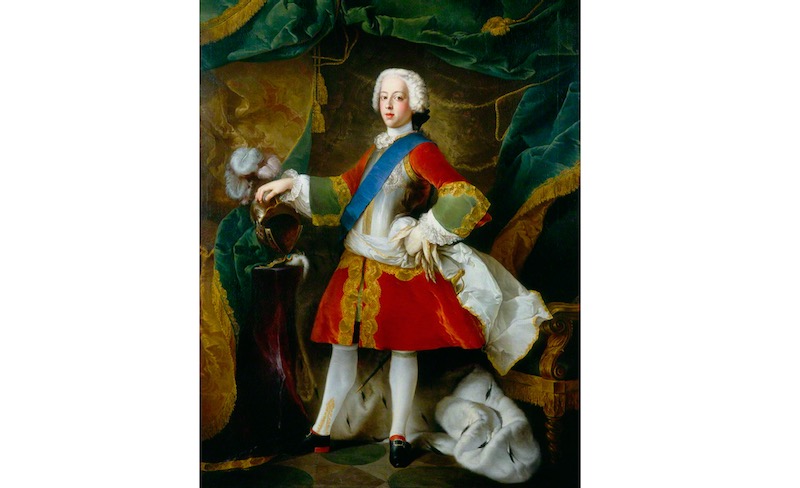When Charles Mountbatten-Windsor is crowned as King Charles III on May 6, it will not only be those who favour a British republic who demur. Jacobites, of whom there are still some around, consider that it is Charles Edward Stuart (1720-1788), aka the “Young Pretender” or “Bonnie Prince Charlie” who had legitimate claim to that title.
The Jacobites were supporters of King James II (1633-1701) – in Latin, “Jacobus” – who was deposed as king in the so-called “Glorious Revolution” of 1688. James had converted to Catholicism, and, more to the point, had produced a son, James Francis Edward, by his second wife, Mary of Modena, who would be baptized as a Catholic, thus promising a Catholic succession to the English and Scottish thrones. Moreover, James had decreed toleration for Roman Catholics and non-Anglican Protestants in the Declaration of Indulgence. This was intolerable to the Anglican dominated English Parliament, who forced James into exile, declared the throne vacant, and invited his older Protestant daughter by his first wife, Mary, and her husband, the Dutch Prince William of Orange, to assume the throne. At the same time Parliament declared that no Roman Catholic could ascend the throne nor any English monarch marry a Roman Catholic: provisions of the British Constitution that are still in effect today.
James was received in exile by his ally and cousin, Louis XIV, who continued to recognize his title and, indeed, provided him with troops for an invasion of Ireland that ended disastrously for James at the Battle of the Boyne in 1690. James returned to France, where he died in 1701, to be succeeded by his son James, recognized by the Jacobites (and by Louis XIV) as James III, also termed the “Old Pretender.” He led a rising in Scotland in 1715 after the accession of the first Hanoverian King, George I, which was also defeated. With the death of Louis XIV, James removed to Rome, and leadership of the Stuart cause was taken up by his son, Charles, the “Young Pretender,” who led a last Jacobite rising in 1745 that was defeated at the battle of Culloden in 1746. Given the romance at first associated with “the lost cause” and “Bonnie Prince Charlie,” the rest of Charles’ life was a sad one. When his father died in 1766, it was only the Jacobite faithful who recognized his title as Charles III: neither the pope nor the kings of France and Spain were willing to do so. Charles descended into alcoholism, was estranged from his wife, and died without legitimate heirs. The Stuart succession then passed to his brother Henry, Duke of York, recognized as “Henry IX” by the Jacobites. But Henry was a Roman Catholic cardinal, indeed, eventually dean of the College of Cardinals and arch-priest of St. Peter’s Basilica. Even apart from that, he was unlikely to have produced an heir, as he was rumored to be homosexual. When Henry died in 1807 the direct Stuart line ended. Henry was buried, along with his brother Charles, his mother and his father, in St. Peter’s Basilica, where there is a monument to the royal Stuarts which was restored some years ago at the expense of the late Queen Mother, Elizabeth.
With the death of Henry Stuart, the Stuart succession, in the view of the Jacobites, passed to Charles Emmanuel, King of Sardinia, descendent of a sister of James II; thence to the House of Austria-Este and finally to the Wittelsbachs, the royal house of Bavaria, where it presently resides with Franz, Duke of Bavaria, and pretender to the now defunct (since 1918) throne of Bavaria. Franz has never asserted a claim to the British throne. The Duke is gay and lives with his partner, and so the putative succession will pass on to his brother Max and thence to Max’s daughter (he has no sons), Princess Sophie, who is married to the fabulously wealthy Alois, Hereditary Prince of Liechtenstein, who could probably buy the United Kingdom in its current condition as a present for his wife! Princess Sophie has a son, Prince Joseph Wenzel, age 27, who will eventually become the Stuart claimant, although he would not be eligible to occupy the British throne because he is a Roman Catholic!
The Jacobites still persist in the United Kingdom in the form of the Royal Stuart Society. They recognize the Duke of Bavaria as head of the royal house of Stuart, although they refrain from making any claims for him that he does not make himself. They hold annual services to commemorate the executions of Charles I and Mary Queen of Scots, and the birthday of James II. Often, they meet in the parish hall of the Farm Street Jesuit Church!
Jeffrey P. von Arx, S.J., FRHistS is Visiting Professor of the History of Christianity, Boston College School of Theology and Ministry, Massachusetts and Superior and Director, John LaFarge House, Massachusetts.



 Loading ...
Loading ...
What do you think?
You can post as a subscriber user ...
User comments (0)